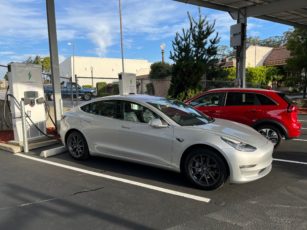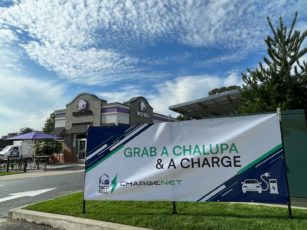CPUC OK’s $1B Plan / EVs: Building CA’s Charging Network / ChargeNet Stations
BY KAREN PEARLMAN of San Diego Business Journal
When the California Public Utilities Commission announced last month that it was adopting a five-year, statewide $1B transportation electrification program, companies like San Diego-based ChargeNet Stations celebrated the news.
The CPUC’s decision about the groundbreaking investment means there will be a unified policy-driven funding structure for utility transportation electrification efforts through 2030 – in line with California’s plans to ban the sales of new gas-powered cars and trucks by 2035.
The CPUC’s decision also prioritizes investments in charging infrastructure for low-income, tribal, and underserved utility customers.
The underserved population is a large part of ChargeNet Stations’ audience. The company, founded in 2020, builds fast-charging electrification stations in places where they are most needed, primarily at quick-serve restaurants in lower-income neighborhoods.

CEO
ChargeNet Stations
Tosh Dutt, founder, and CEO of ChargeNet Stations, praised the latest CPUC action.
“The California Public Utilities Commission has been taking on vehicle electrification and infrastructure on their front foot,” Dutt said. “That is, they’ve been very proactive with providing incentives and really thought-through programs on how companies like us can access those funds, and actually implement them and do it in such a way that it benefits the most Californians as possible.
“The billion dollars will build on programs that they’ve already rolled out… providing developers like us the incentives to find investors to finance the public EV charging infrastructure, the batteries, and for us the renewable energy as well.”

Governor
California
California Gov. Gavin Newsom said that California is leading the world in the zero-emission vehicle revolution. He said that the $1 billion investment will continue building out the state’s charging infrastructure “to make the transition to electric vehicles easier than ever.”
“This complements the $10 billion package we enacted to build out the infrastructure and make it more affordable for Californians to make their own transition to electric vehicles, part of our overall $54 billion California Climate Commitment,” he said.
Newsom said that the collective effort is how zero-emission transportation in the future will become a reality, “cutting pollution and driving economic opportunity for Californians.”
Dutt said he thought “California has done a really good job rolling out first iteration, (and has been) able to take in lot of really great lessons.”
“They’re ensuring there’s equity between the larger charge point operators like Tesla, EV Go, Electrify America and Charge Point, and us folks newer to the market,” he said, “ensuring we have the ability to provide our technology and solution to benefit in California drivers with the same opportunity.”
The CPUC said that 70 percent of the funds will go toward charging for medium-and heavy-duty vehicles, – those responsible for the bulk of greenhouse gas emissions and other air pollutants from the transportation sector. Thirty percent will go toward light-duty charging at or near multi-unit housing.
The program offers rebates for customer-side EV infrastructure investments at commercial, industrial and residential sites beginning in 2025, and provides higher rebates for projects in underserved, disadvantaged and tribal communities. The CPUC champions the building of charging infrastructure in what it considers hard-to-reach communities.

Commissioner
California Public Utilities Commission
Electric vehicles are central to California’s climate goals and clean energy future, said CPUC Commissioner Clifford Rechtschaffen.
“Our decision advances the state’s climate goals by creating a new, streamlined program for utility funding of EV charging infrastructure,” he said. “The decision has a very strong focus on equity and directs utilities to help customers connect to the grid and manage their energy use.”
The action resolves transportation policy framework in development since 2020 and furthers EVs as an energy resource in strategies promoting vehicle-grid integration. The CPUC heavily promotes EV adoption and infrastructure and is overseeing investor-owned utilities’ plans to upgrade the distribution grid to meet the new load EV charging will create.
The CPUC’s Integrated Resource Planning proceeding, which ensures there will be sufficient electric generation and transmission capacity to meet reliability and GHG reduction goals, is planning for a flurry of EVs to guide procurement and infrastructure decisions.
ChargeNet Stations
FOUNDED: 2019
FOUNDER AND CEO: Tosh Dutt
HEADQUARTERS: San Diego
BUSINESS: Developer of electric vehicle charging stations.
EMPLOYEES: 40, including interns
WEBSITE: chargenetstations.com
CONTACT: 858-381-0458
SOCIAL IMPACT: ChargeNet Stations’ mission is to “democratize” reliable EV fast-charging, so it’s available to everyone all the time, everywhere – especially in underserved communities
NOTABLE: ChargeNet Stations has partnerships with top restaurant brands and franchisee groups at more than 100 quick-serve restaurants across California – and beyond, beginning in 2023


